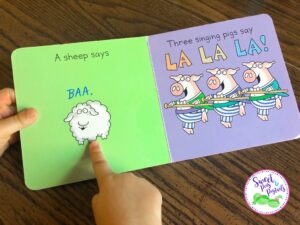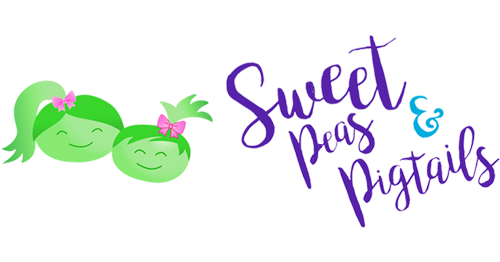I admit that I actually didn’t know who Sandra Boynton was until my oldest daughter was about to turn one. At that point, I had already been a speech-language pathologist for eight years!
Right before her first birthday, I began researching books to use with her to build her speech and language skills. This was one of the books that popped up and she ended up getting this book along with some other Sandra Boynton books for her first birthday.
If you have little ones at home or on your caseload, and you are looking to build speech and language skills, this book is a must!
So, what are some things you can work on with this book? I’m glad you asked! Here are some ways I incorporated this book with my own children as well as the kiddos on my caseload:
1. Identifying and naming animals
There are lots of pictures of animals in this book, including a cow, duck, horse, sheep, pigs, rhinos, dogs, and cats. First see if your child can point to the picture of the animal that you name. Then when he or she is successful with that task, see if they can name the animal when you point to it!

2. Teaching animal sounds
Did you know that animal sounds can be counted as words? As I’m evaluating children for speech and language delays, I’ll often ask parents approximately how many words they think their child may speak. Oftentimes animal sounds are not counted in the total number, but when they hear that their child is actually saying a few more words than they thought, it brings some encouragement.
This book is perfect to practice those animal sounds (hence the title 😉). Work on moo, baa, neigh, ruff, bow wow, meow, oink, etc. Sometimes I’ll sing a song to the tune of “Wheels on the Bus” with this book: “the cow on the bus says moo, moo moo, moo, moo, moo, moo, moo, moo, the cow on the bus says moo, moo, moo, all through the town.” The kids always seem to enjoy this activity!
3. Teaching basic concepts
You can easily sneak in some basic concept practice with this book! I usually work on teaching big/little (the dog is little and the rhino is big) and same/different (a sheep and a pig are different), etc. We also sometimes work on quiet/loud by saying the animal sounds with a soft voice and then with a loud voice… the kids get a kick out of that one!
4. Naming simple actions
I like to describe to my kids what the animals are doing. The book displays the animals performing simple actions such as standing, running, singing, and dancing. Sometimes we’ll get our bodies moving and perform the actions ourselves! If you are a parent or you work with kids, you know movement is a must with little ones!
Have you read this book in speech therapy or with your little ones at home?! I’d love to hear how you use it! If you would like some more fun speech & language activities to use with your little ones, check out my Teachers Pay Teachers Store!

Hi Jennifer! When I was reading this article, I remembered how my husband used to say nonsense words to our daughter when she was a baby, and she loved it. They would just babble away with funny sounds that didn’t mean anything, and start to giggle. In retrospect, I think it really helped her language development. Maybe because she felt that someone wanted to communicate with her and that no matter what noise she made back, it was accepted and got a response. It probably exercised her mouth muscles too. I imagine making animal sounds would have a similar effect – sounds like fun! (P.S. Our daughter is 20 and still enjoys ridiculous word games with her Dad 🙂 ) Thanks for posting!
I like your blog, so I am going to send a link to all of my children and grandchildren. Thank you for likig my blog, as well.
very wise and interactive approach